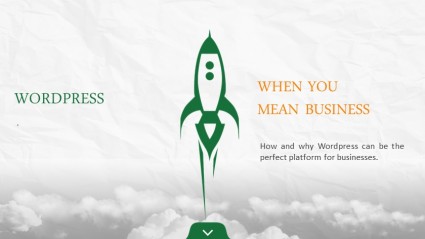WordPress powers more than 40% of all websites worldwide, making it the most dominant content management system (CMS). But as technology evolves, so does WordPress. For businesses, staying ahead of these changes is crucial to remain competitive online.
This article explores the future of WordPress and what it means for small, medium, and enterprise-level businesses.
Contents
- 1 1. Headless WordPress Will Become More Mainstream
- 2 2. Artificial Intelligence (AI) Integration
- 3 3. Focus on Performance and Core Web Vitals
- 4 4. E-Commerce Growth with WooCommerce
- 5 5. Security and Privacy Enhancements
- 6 6. Community and Open-Source Strength
- 7 7. WordPress as a Business Platform, Not Just a Website
- 8 FAQ
- 9 Related Posts
1. Headless WordPress Will Become More Mainstream
The rise of headless CMS means businesses can use WordPress only for content management while relying on frameworks like Next.js, React, or Vue.js for front-end delivery.
Why it matters for businesses:
-
Faster websites with better SEO performance.
-
Omnichannel publishing across websites, apps, and IoT devices.
-
Greater flexibility for custom designs and experiences.
2. Artificial Intelligence (AI) Integration
AI is already shaping WordPress through tools like AI content writers, SEO optimizers, and chatbots. Future WordPress updates will likely bring AI-powered personalization, recommendations, and predictive analytics.
Why it matters for businesses:
-
Smarter content creation and marketing automation.
-
Personalized shopping or reading experiences.
-
Improved customer engagement with AI-driven support.
3. Focus on Performance and Core Web Vitals
Google continues to prioritize Core Web Vitals in rankings. WordPress developers are working on making themes, plugins, and the core itself more lightweight and efficient.
Why it matters for businesses:
-
Better SEO rankings.
-
Higher conversion rates due to faster-loading websites.
-
Reduced bounce rates, especially on mobile.
4. E-Commerce Growth with WooCommerce
WooCommerce already dominates as the most popular e-commerce plugin. Future improvements will focus on scalability, automation, and AI-driven product recommendations.
Why it matters for businesses:
-
More advanced tools for online sales.
-
Easier integration with global payment systems.
-
Opportunities to compete with Shopify and BigCommerce.
5. Security and Privacy Enhancements
With cyber threats increasing, WordPress is investing in stronger default security measures and better integration with privacy tools (such as GDPR and data compliance frameworks).
Why it matters for businesses:
-
Reduced risk of data breaches.
-
Increased customer trust.
-
Easier compliance with global regulations.
6. Community and Open-Source Strength
The WordPress ecosystem thrives on its global community of developers, designers, and contributors. The future will see even more collaboration and innovation in themes, plugins, and integrations.
Why it matters for businesses:
-
Access to thousands of affordable tools and extensions.
-
Constant innovation without vendor lock-in.
-
Ability to scale websites without starting from scratch.
7. WordPress as a Business Platform, Not Just a Website
The future of WordPress will go beyond simple websites. It will become a hub for digital experience platforms (DXPs), combining websites, e-commerce, marketing automation, and customer management into one system.
Why it matters for businesses:
-
Consolidation of multiple tools into a single platform.
-
Better insights through integrated analytics.
-
Cost savings compared to fragmented SaaS solutions.
FAQ
Q: Will WordPress still be relevant in the next 5–10 years?
Yes. With its open-source nature and continuous innovation, WordPress is positioned to remain a leader in CMS technology.
Q: Should businesses switch to headless WordPress?
Not all businesses need it. It’s best for companies prioritizing speed, scalability, and multi-platform publishing.
Q: How will AI affect WordPress websites?
AI will streamline content creation, enhance personalization, and improve SEO—helping businesses work smarter.
Q: Is WordPress still good for e-commerce?
Absolutely. WooCommerce continues to evolve, offering powerful tools for businesses of all sizes.
Q: What should businesses do now to prepare?
Invest in speed, security, and flexible themes/plugins. Also, explore AI integrations and stay updated with WordPress releases.
👉 The future of WordPress is AI-driven, performance-focused, and business-ready. For companies, adopting these innovations early can lead to stronger online visibility, better customer experiences, and sustainable growth.
